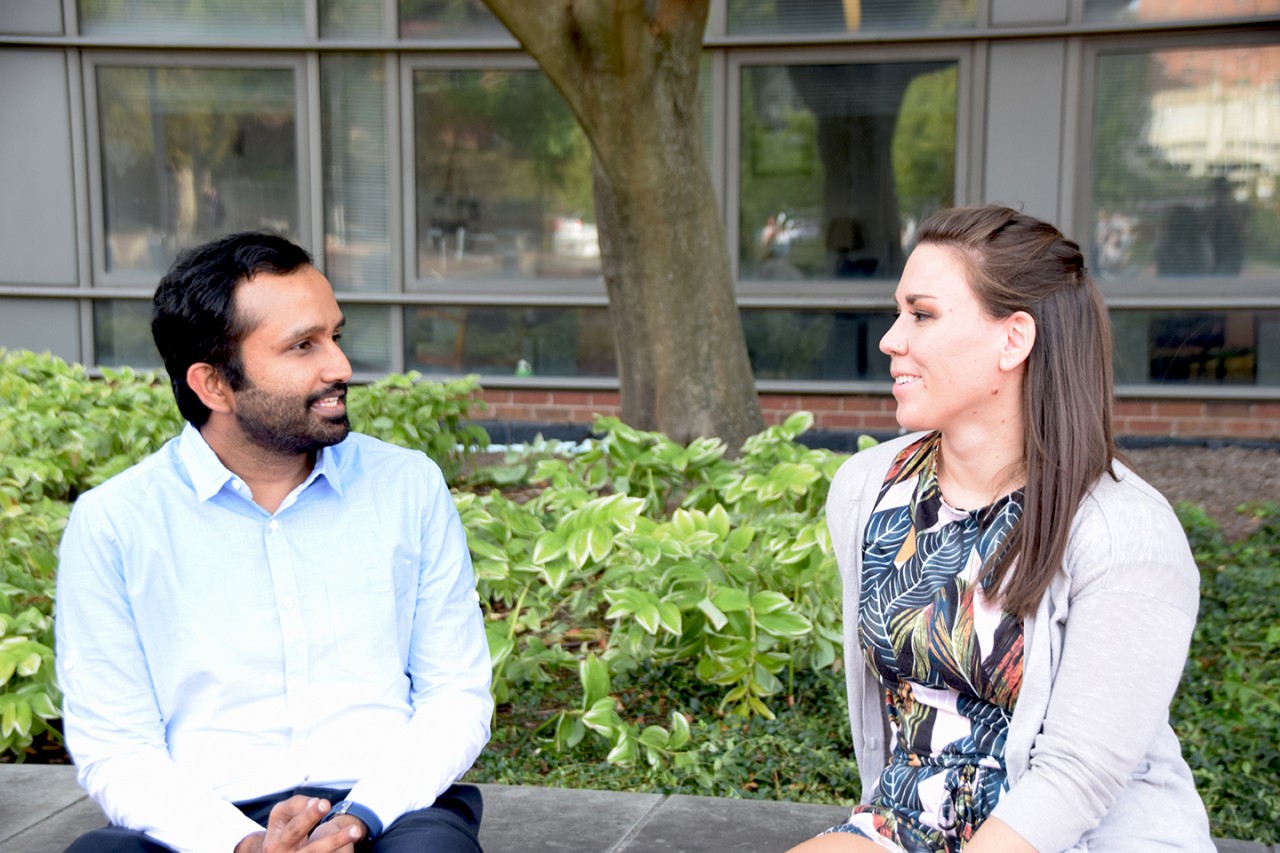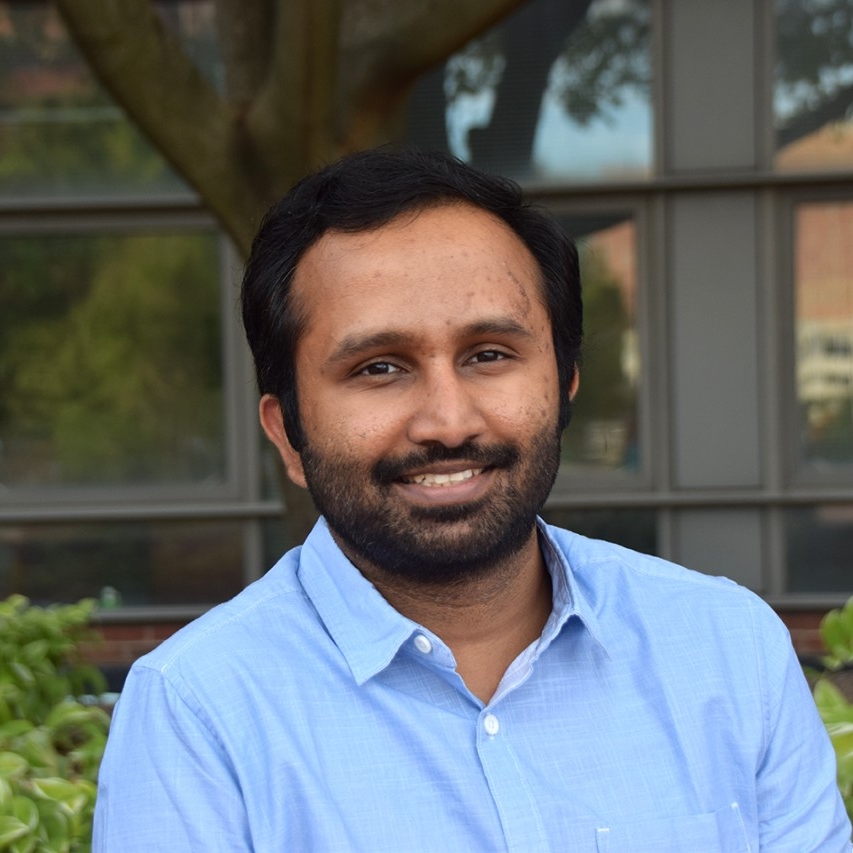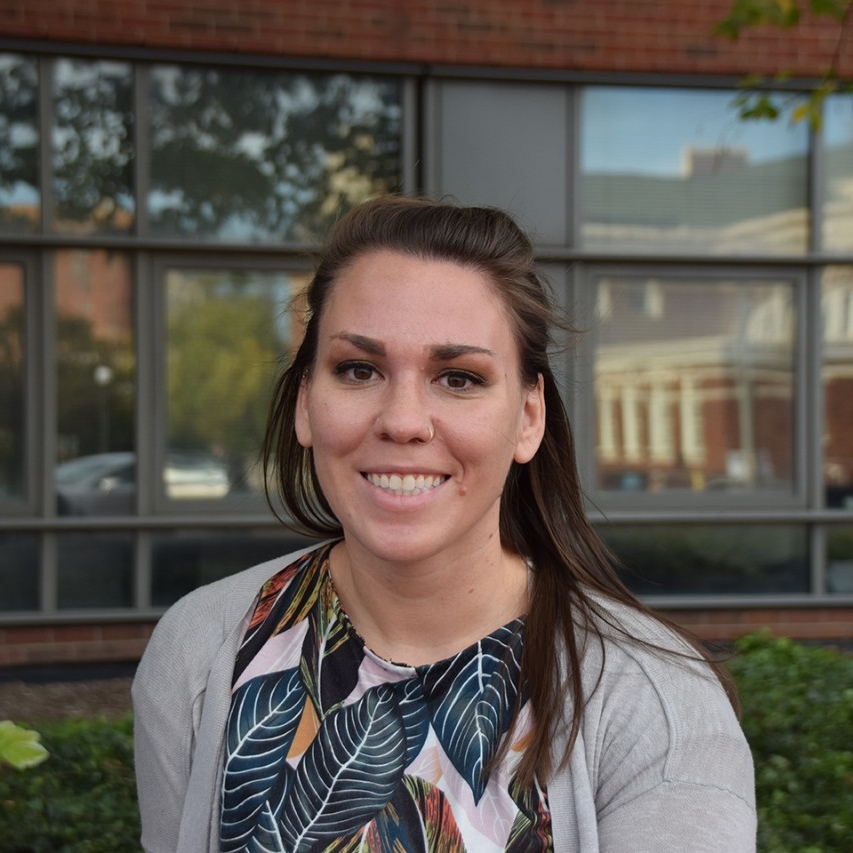A Space for Virtual Togetherness: The Graduate Student Peer Support Group
Written by Erin Michel, graduate assistant for The Graduate School.

Gibin Raju and Stephanie Merrilees, leaders for the Graduate Student Peer Support group.
As soon as I log on to the Zoom session of the Graduate Student Peer Support group, a member welcomes me, realizing I am new, and invites me to share as I am comfortable. Soon I find myself engaging and opening up. With the warmth of the group and the earnest faces looking back at me from their little boxes on the screen, sharing is easier than I thought. The session is free flowing, with minimal intervention from the leaders; they step in when there are lulls, posing questions or contributing their own points. It’s evident that they want group members to have the power to use their time how it is most needed. For the rest of the day, I feel calmer, lighter, and more focused than usual.

According to group leaders Gibin Raju and Stephanie Merrilees, that’s the power of peer support. “Maybe nobody in the group has gone through your exact experience,” says Stephanie. “But they can relate to you on an emotional level [….] I’ve felt disrespected, I’ve felt unseen. I’ve had those emotions, and being vulnerable and genuine, that’s where you make your best connections.”
“You should not suffer in silence,” adds Gibin. “It’s good to talk to someone about it [….] Sometimes people are afraid to open up because they are afraid of getting rejected. If you know that a set of students exists where they are talking about this in a group, well, that would probably be an ideal place to open up.”
Stephanie, a 4th year Counselor Education PhD student, and Gibin, a 3rd year Engineering Education PhD student, launched the group last spring because they saw a need for this kind of space on campus. The program has been a long time in the works, though—according to Gibin, it all started roughly three years ago when the Graduate Student Government and CECH’s Graduate Student Association (GSA) declared mental health a priority within their respective agendas. It has taken a while for the group get off the ground, however; figuring out where they fit in with the existing resources such as CAPS and BearCat Support Network was a process. While these programs certainly offer valuable opportunities to graduate students (including individual and group counseling), Stephanie and Gibin recognized the need for a supportive peer group space with a sole focus on the unique issues faced by the graduate community. As Gibin puts it, “Graduate students... their needs are different, their age group is different, because we have students from 25 to 60s, even. They have their own problems [….] so we need to work differently.”

So Gibin and Stephanie struck out on their own, and, with the backing of CECH, formed the group. Sessions are open to all graduate students across UC, and students are welcome to bring whatever issues they want into sessions. While their program is not psychotherapy or mental health counseling but rather peer support, Stephanie and Gibin do not want to put limits on what members are free to discuss. “A big goal of ours is to destigmatize mental illness,” says Stephanie. “So if you feel comfortable bringing that to the group, this is the space where, as facilitators, we have a responsibility of keeping everybody in line, keeping those conversations safe.”
Because of this, it does occur that group members disclose diagnoses, and talk about how they are coping with mental illness. At the same time, the group is also appropriate for those who are experiencing stress or anxiety that is directly tied to their studies, and not indicative of a mental health disorder. “Graduate school is really hard,” Stephanie tells me. “A lot of symptoms you experience might not be diagnosable mental illness. You might be anxious, you might be depressed, but you don’t have chronic anxiety or chronic depression. So it’s hard to seek out counseling sometimes when you aren’t meeting those criteria and you just need somebody to be like, ‘yeah, this is really difficult and I’m going through the same thing.’”
This connection over shared experience is one of the biggest strengths of the support group model, because with a variety of personalities in a group, the odds are greater that a member will receive the kind of response they are hoping for. Everyone is different, and everyone has different preferences when it comes to seeking support. As Stephanie puts it, “We have people who like to give advice and solve problems, and they’re like, ‘Text me and I’ll help you with your homework.’ And there’s other people that are like, ‘I hear you. And that’s tough. And we’re glad you’re at group today.’"
The group has grown and developed since its inception last spring, but Gibin admits that there’s still more they’d like to do. Because the group is dependent on the two leaders’ schedules, they are only able to offer it once per week, on Tuesday evenings from 5 to 6 p.m. But there are many students in the Bearcat community who would like to participate but can’t, due to the time limitations. “I am finding it difficult to say no to them,” Gibin tells me. “But if we have more facilitators, we can basically open it.”
Stephanie and Gibin have created a handbook to train future group leaders and are also willing to give their time for one-on-one training. They are seeking volunteers who have some experience in crisis management—students in programs such as counseling or psychiatric nursing would be ideal candidates. If you are interested in supporting the Peer Support Group as a facilitator, contact Stephanie (merrilse@mail.uc.edu) or Gibin (rajugm@mail.uc.edu). “We need to find people who are passionate about mental health,” says Gibin.
Gibin and Stephanie also hope to see more graduate students take advantage of their group by joining as participants. “You don’t have to share your deepest, darkest secrets,” says Stephanie. “But be willing to connect on that emotional level, and really hear where somebody is coming from.” You’ll be surprised at how great it feels—just take it from me.
Support group meetings take place via Zoom or WebEx every Tuesday, 5:00 - 6:00 p.m. Please direct all inquiries for the support group to Stephanie Merrilees (merrilse@mail.uc.edu) and Gibin Raju (rajugm@mail.uc.edu). For more information about the support group or to subscribe for their mailing list, visit their webpage.